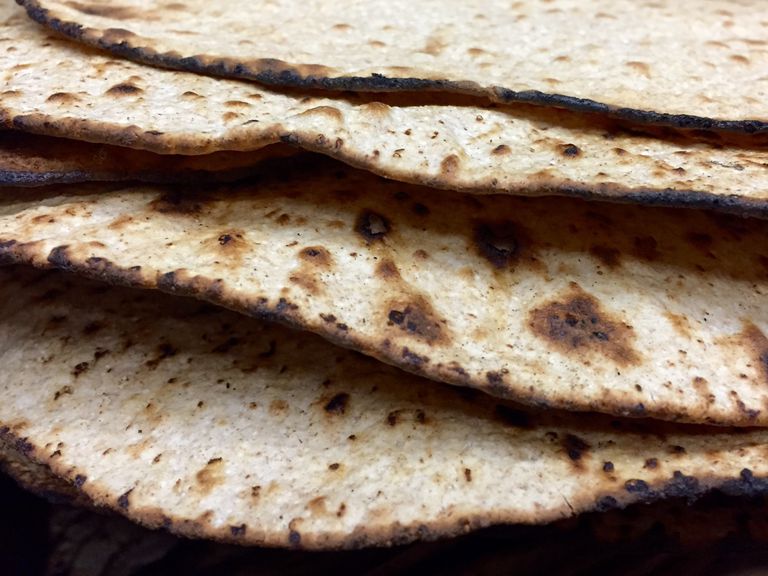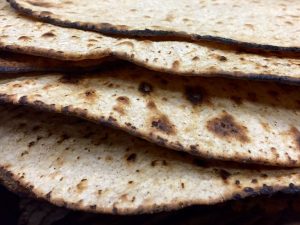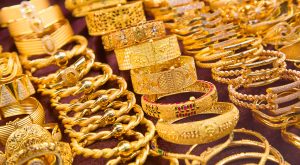Four mazel tov shout outs this week, let’s begin with Michelle.
A big mazel tov to Michelle Charnoff, she the very talented and brilliantly funny daughter of our good friends Ashley and Judah Charnoff, upon her very recent engagement to Brian Polay, he the son of Cheri and Gary Polay of Wayne, New Jersey. Mazel tov to the extended Charnoff and Polay families. May Michelle and Brian go through life laughing at every opportunity.
And another big mazel tov, this one to our friends Donna and Ed Stroh upon the engagement of their givaldige son Daniel who got engaged -earlier this week- to Miriam Wilson, she the daughter of Colonel Nosson (Ken) and Devorah Wilson, they of Norfolk Virginia. Mazel tov to both extended families.
Mazel tov to our friends Helene and Larry Sher upon the arrival of a granddaughter born to their children Alex and Jonathan Feld. May baby Feld bring her parents, and very excited grandparents – the Shers, and their machatunim, Julia and Seymour Feld, much and only nachas and joy.
Mazel tov again to the entire Abittan and Hochbaum families upon the beautiful wedding this past Sunday of their children Deena to Mordechai Abittan.
Passover Observance in the year 2048.
2048? Wasn’t Pesach first introduced in the year 2448? Was their pre observance? Though we are taught not to begin a sentence with the word though, and though the Oisvorfer’s calendar confirms that we are still in January, albeit late in January, and though on the Hebrew calendar as this review is being written, it is but the 3rd day of the month of Shevat, and by definition the 15th of Nissan, or Pesach is still some 70 days away, earlier this week, the Oisvorfer received email from the shul regarding the placement of matzo orders for the coming Pesach. Nu, avada preparation is vichtig (important) and for that reason, Pesach get-away-programs throughout the globe have been advertising since before Chanukah. They, like Paroy, have been asking “mi vo’mih o’hoilchim” (who’s going to be with them)? And though our parsha deals with the last three makos (plagues) the RBSO visited upon Paroy and his Mitzrim, the parsha does -mamish in mittin derrinnin- (in the midst of the makos drama mamish), introduce a brand-new topic: Pesach. The basic laws are all laid out in not too many pisukim. How our sages took these and created hundreds of new laws, stringencies, and customs out of them is a tribute avada to their skills; entrepreneurial and others. Pesach, today in our times, is perhaps the biggest of all business created by the RBSO in His successful endeavor to put many Yiddin to work, and for others to support them by spending ridiculous amounts of money in preparation for, and for the actual eight-day observance. He, and later they, our sages, and even later, modern day rebbes,somehow massaged new ones into law. How that’s permissible,ver veyst; go argue.
Nu since we’re speaking of Pesach and since we mentioned matzo which is prominently featured in our parsha, let’s also harken back. To what and to when? To 400 years or so earlier, and let us begin our review of Pesach and matzo there. Why go back? Was there Pesach earlier than in Parshas Bo? Earlier than the year 2448? We shall explore that below.
 Speaking of Bo, the Oisvorfer has but one chaver by that name and earlier today, when the webmaster reminded me that it’s Wednesday afternoon and that I should not shirk my responsibility of writing, though the Oisvorfer has been sleeping in the city while working on a special project, and very much occupied. He also reminded me to shout out Bo Weinstein as we have done in the past in; here we go: Hello Bo! Shoin, done, veyter, and back to matzo and Pesach.
Speaking of Bo, the Oisvorfer has but one chaver by that name and earlier today, when the webmaster reminded me that it’s Wednesday afternoon and that I should not shirk my responsibility of writing, though the Oisvorfer has been sleeping in the city while working on a special project, and very much occupied. He also reminded me to shout out Bo Weinstein as we have done in the past in; here we go: Hello Bo! Shoin, done, veyter, and back to matzo and Pesach.
Ober one more table setter before we get to the ikartoichen (main topic of discussion and critical content of the review). Just last week we mentioned that none of the Toirah personalities we met and got to know in Sefer Bereishis appear again by name throughout the heylige Toirah. We will meet them again as we do yearly on Simchas Toirah when we begin a new cycle of Toirah reading. Last week we did however shout out the nochosh (snake) as he does indeed make other appearances; let’s recall however that although he was somehow able to con Chava and sweet talk her into eating and also enjoying, if you chap, he was not human. Seemingly, he did somehow resemble man. How? Let’s recall that he did speak, he did enjoy eating fruit, -forbidden and not, just like man-and also stood erect, if you chap. Grada standing erect , talking, and enjoying fruit-forbidden and not-at the same time, doesn’t always translate into human behavior, if you chap. Ober was the Oisvorfer wrong? Are there efsher humans whom we met in Bereishis who do appear in Shmois or elsewhere? Let’s find out as we dig a bit deeper into the origins of matzo and Pesach.
And the answer is yes and no. The Oisvorfer stands by his comment: none of the human characters we met in Bereishis appear again in Shmois or elsewhere in the heylige Toirah. Ober………….a few do seemingly appear in Rashi, the Radak, and specifically the medrish, and this week, mamish in our parsha, two of them come to life. Let’s meet them.
As mentioned above, the RBSO interrupts the history of the plagues to introduce Pesach. We are taught that we are to celebrate Pesach each year on the fifteenth of Nissan –in fact, in our parsha, Nissan takes over from the month of Tishrei as the first month of the Jewish lunar calendar. Pesach commemorates our freedom from bondage and from Mitzrayim in Nissan. We are to eat unleavened bread -what we call matzo- because it bakes fast -in under 18 minutes including all prep work. That’s what our ancestors did while leaving Mitzrayim, they had no time to fully bake the bread. Of course not; they were all too busy schlepping gold, silver, other valuables, and clothing they borrowed –seemingly permanently- from their friendly Egyptian neighbors. Shoin, matzo it was. And we are taught the Yiddin celebrated their first Pesach in the wilderness. Ober is that emes? Was there a Pesach before? Did anyone we previously met celebrate Pesach? And if we did meet them, and if they did mark Pesach, what the hec was that person celebrating before the RBSO formally introduced Pesach to His Chosen People?
Nu…as you avada know, our sages were very well versed in the heylige Toirah, they read and looked into every word and wanted to chap just what each meant literally and figuratively. And if a word or sentence bothered them, or, if they were left unfulfilled by the literal meaning of the words, they dug deeper. And if they still couldn’t find satisfaction – though it’s avada bavust (well known and accepted) that digging deeper does at times lead to satisfaction, if you chap, they got even more creative; they imagined their own versions, their own scenarios of what went down. And with that introduction, let us go back some 400 years and say hello to Avrohom Ovenu (our forefather Abraham)and to his bavusta (famous or even infamous) and somewhat controversial nephew Loit (Lot). They’re back! And they are back because both were seemingly involved in celebrating Pesach, each in their own way. Ober, how is that possible? There was and is no mention of Pesach in Sefer Bereishis, or is there? Was Loit imbued with ruach hakoidesh (divine spirit)? Did he know the RBSO was going to decree Pesach 400 years later? Was he that observant? And his involvement? Shoin, let’s read the relevant posik and see just how clever Rashi and others were. And before we address Loit’s Pesach observance, let’s go back just a few chapters and read of Avrohom’s Pesach celebration, 400 years before our parsha takes place. Do I have your attention? Givaldig! Ober, why would Avrohom be celebrating Pesach? And how did our sages of yore connect both Avrohom and Loit to our parsha and Pesach as introduced and instructed? Let’s find out, ober in order to chap just how clever and creative our sages were, we needto go back and re-learn a number of pisukim from Sefer Bereishis, let us begin with Avrohom.
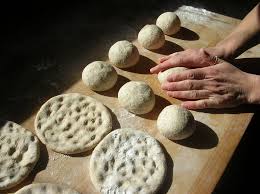 Let’s harken back to the beginning of Parshas Vayero where it’s three days post Avrohom’sbris. A recuperating Avrohom is visited by three angels disguised of course as men. Avrohom, the paradigm of hachnosasoirchim(hospitality) announces to his wife Soro that they have unexpected company; you know how women love surprise company, not! In any event, we read these words in the heylige Toirah (Bereishis 18:6): “And Avrohom hurried to the tent to Soro and said, “make ready quickly three measures of the meal, knead it and make “ugois.” What are ugois? Rabbi Art Scroll and many others translate the word ugois as cakes. And? Says the Medrish so gishmak, azoy: this event, the visit, and the cake preparation took place on Pesach! Mamish? Says the medrish veyter, azoy: Avrohom and Soro both observed the entire Toirah kula (entire Toirah with all its commandments) though it,and they, weren’t yet revealed or gifted to the Yiddin. How was that shayich? Avrohom and Soro were seemingly imbued with the Divine Spirit, and as a result, knew of its existence and contents. Therefore,they already observed Pesach and all its trimmings. Therefore, Avrohom davka wanted Soro to knead the dough, to make the cakes with her own hands, under her own supervision, to ensure that the dough would remain unleavened. In other words: Avrohom served the malochim (angels) Pesach cake.
Let’s harken back to the beginning of Parshas Vayero where it’s three days post Avrohom’sbris. A recuperating Avrohom is visited by three angels disguised of course as men. Avrohom, the paradigm of hachnosasoirchim(hospitality) announces to his wife Soro that they have unexpected company; you know how women love surprise company, not! In any event, we read these words in the heylige Toirah (Bereishis 18:6): “And Avrohom hurried to the tent to Soro and said, “make ready quickly three measures of the meal, knead it and make “ugois.” What are ugois? Rabbi Art Scroll and many others translate the word ugois as cakes. And? Says the Medrish so gishmak, azoy: this event, the visit, and the cake preparation took place on Pesach! Mamish? Says the medrish veyter, azoy: Avrohom and Soro both observed the entire Toirah kula (entire Toirah with all its commandments) though it,and they, weren’t yet revealed or gifted to the Yiddin. How was that shayich? Avrohom and Soro were seemingly imbued with the Divine Spirit, and as a result, knew of its existence and contents. Therefore,they already observed Pesach and all its trimmings. Therefore, Avrohom davka wanted Soro to knead the dough, to make the cakes with her own hands, under her own supervision, to ensure that the dough would remain unleavened. In other words: Avrohom served the malochim (angels) Pesach cake.
That’s a nice story but…how is it related to our parsha? What proof is there that ugois mean Pesach cake? We shall address that below. Of course, there is no mention of Pesach or matzo in this chapter and not even in the story, ober the medrish has this tradition and avada as you know from our favorite tradition man Tevya, we don’t argue with or break with tradition. But wait, there’s more: another medrish tells us that our forefather Yitzchok was born on Pesach. Does the heylige Toirah tell us that? Also not! Ober if the medrish says so, avada it is, or could be so. Ober why would the medrish suggest that Yitzchok was born on Pesach? Did they make it up out of thin air? Also not! Instead, the medrish recalled a few other pisukim (verses) in the heyligeToirah where we read these words. Says the heylige Toirah (Bereishis 18:9-10), azoy:
| 9. And they said to him, “Where is Soro your wife?” And he said, “Behold in the tent.”
|
טוַיֹּֽאמְר֣וּ אֵלָ֔יו אַיֵּ֖ה שָׂרָ֣ה אִשְׁתֶּ֑ךָ וַיֹּ֖אמֶר הִנֵּ֥ה בָאֹֽהֶל: | |
| 10. And he said, “I will surely return to you at this time next year, and behold, your wife Soro will have a son.” And Soro heard from the entrance of the tent, and it was behind him. | יוַיֹּ֗אמֶר שׁ֣וֹב אָשׁ֤וּב אֵלֶ֨יךָ֙ כָּעֵ֣ת חַיָּ֔ה וְהִנֵּה־בֵ֖ן לְשָׂרָ֣ה אִשְׁתֶּ֑ךָ וְשָׂרָ֥ה שֹׁמַ֛עַת פֶּ֥תַח הָאֹ֖הֶל וְה֥וּא אַֽחֲרָֽיו: |
The bottom line of this medrish is azoy: the malochim told Soro they were coming back next year this time. And what time was that? The very time that Avrohom served them ugois, Pesach cake. A year later, taka just as they predicted, Yitzchok was born, and by extension, he was born on Pesach. Is that gishmak or what? The bottom line: in this case and in others, the medrish mamish figured things out logically. Avada there are times when the medrish pontificates without logic, ober that should not turn you off to medrish. They were mamish creative with vilde imaginations (wild thoughts) and they could of course be true; why not and go prove otherwise.
Ok, that a nice story but how is it related to our parsha. Nu, ye of little faith, let’s close the loop. In parshas Boi, as the RBSO is giving His Pesach introduction, rationale and instructions, we find these words in Shmois 12:39.
| 39. They baked the dough that they had taken out of Egypt as unleavened cakes, for it had not leavened, for they were driven out of Egypt, and they could not tarry, and also, they had not made provisions for themselves. | לטוַיֹּאפ֨וּ אֶת־הַבָּצֵ֜ק אֲשֶׁ֨ר הוֹצִ֧יאוּ מִמִּצְרַ֛יִם עֻגֹ֥ת מַצּ֖וֹת כִּ֣י לֹ֣א חָמֵ֑ץ כִּי־גֹֽרְשׁ֣וּ מִמִּצְרַ֗יִם וְלֹ֤א יָֽכְלוּ֙ לְהִתְמַהְמֵ֔הַּ וְגַם־צֵדָ֖ה לֹֽא־עָשׂ֥וּ לָהֶֽם: |
Did you see that word ugois in the posik above? Read it again. The Yiddin baked ugois. You hear this raboyseyee? The Yiddin just left Egypt after 430 years (don’t get me started with an explanation of why we mentioned 400 years earlier and now mention 430. The heylige Toirah mentions both numbers and we have previously reconciled the difference. Veyter). What were the Yiddin to eat as they left Mitzrayim? Pizza? Falafel? Sushi efsher? Not! Instead they made ugois, cakes. The same cakes Avrohom had Soro baked for the malochim. Shoin, it’s a match. Bottom line: ugois = cakes = Pesach. So gishmak!
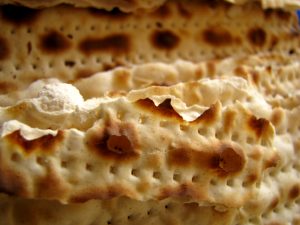 Ober what about Loit? Did we not mention earlier that Loit too observed the yet to be revealed Pesach? Was he too so holy a man? Was he too imbued with the Divine Spirit? Was he also a holy guy? Ober, does not the heylige Toirah tell us that he bedded and impregnated both of his own daughters? It does! Does not the heylige Gemora and medrish take him to task for these incestuous acts while giving the girls a pass? It does. And he still had or kept his divine spirit? The bottom line: just because he did the nasty with his daughters, does not seemingly disqualify him from proper Pesach observance. In other words: sinners, like many of you -Oisvorfer avada included- should not walk away from the RBSO and everything we were taught though we may have acted mamish giferlich in one or even many other areas; seemingly the RBSO still wants us back. Ober what proof do we have that Loit too observed Pesach?
Ober what about Loit? Did we not mention earlier that Loit too observed the yet to be revealed Pesach? Was he too so holy a man? Was he too imbued with the Divine Spirit? Was he also a holy guy? Ober, does not the heylige Toirah tell us that he bedded and impregnated both of his own daughters? It does! Does not the heylige Gemora and medrish take him to task for these incestuous acts while giving the girls a pass? It does. And he still had or kept his divine spirit? The bottom line: just because he did the nasty with his daughters, does not seemingly disqualify him from proper Pesach observance. In other words: sinners, like many of you -Oisvorfer avada included- should not walk away from the RBSO and everything we were taught though we may have acted mamish giferlich in one or even many other areas; seemingly the RBSO still wants us back. Ober what proof do we have that Loit too observed Pesach?
Let’s recall Loit’s story. Two of the three angels who had visited with Avrohom continued on with their pre-planned itinerary: next stop: Sedoim! There they meet Loit who- having learned hospitality, an open-door policy from his uncle Avrohom, invited them in. He too serves them food. Ober what? Says the heylige Toirah (Bereishis 19:3 azoy:
| 3. And he urged them strongly, and they turned in to him, and came into his house, and he made them a feast, and he baked unleavened cakes, and they ate. | גוַיִּפְצַר־בָּ֣ם מְאֹ֔ד וַיָּסֻ֣רוּ אֵלָ֔יו וַיָּבֹ֖אוּ אֶל־בֵּית֑וֹ וַיַּ֤עַשׂ לָהֶם֙ מִשְׁתֶּ֔ה וּמַצּ֥וֹת אָפָ֖ה וַיֹּאכֵֽלוּ: |
Did you read their menu? He served them matzo? Vus epes (why) Matzo? Says the Radak: it’s quite logical. Having learned hospitality from his uncle Avrohom and though he lived among the very bad people of Sedoim, Loit was also big on hospitality. Accordingly, when Loit spotted the strangers, he assumed they were hungry and because it takes less time to bake matzo than bread, and because Loit wanted to be a good host, he served them matzo. Fartig! Their matzo had nothing to do with Pesach. The bottom line: when your guests come in, don’t tarry; serve them food instantly. Case closed? Not! Because says Rashi azoy: Loit baked Matzo since it was Pesach. Again it’s Pesach? Seemingly the angels took a chol-homoied (intermediary days) trip over to Sedoim. And Rashi knows this how and from where? From a medrish of course (Bereishis Rabbah), one found in the heylige Gemora (Rosh Hashono). Of course we are still left wondering why Loit would be observing Pesach 400 years before the Exodus? Andone more shaylo (question): If Pesach was taka observed so early on, what was the big news about Pesach in our parsha?
And if Loit too celebrated, were the Pesach observances by both Avrohom and Loit not then held in the Plains of Mamrey where Avrohom and Soro were at the time, and in Sedoim where Loit was residing? Seemingly they were. And if all that is emes, they were taka the first to observe Pesach. And if they were, both taka make appearances in Sefer Shmois, albeit without a name shoutout.
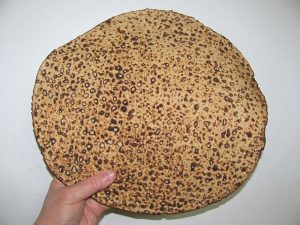 The bottom line: if Avrohom had Soro baked ugois and Loit threw a matzo party, and the malochim partook, it must have been Pesach. Would the RBSO’s angels eat chomatze on Pesach? And would our zeyda Avrohom, a person who observed all the RBSO’s commandments have eaten leavened cake on Pesach? Avada not and case closed.
The bottom line: if Avrohom had Soro baked ugois and Loit threw a matzo party, and the malochim partook, it must have been Pesach. Would the RBSO’s angels eat chomatze on Pesach? And would our zeyda Avrohom, a person who observed all the RBSO’s commandments have eaten leavened cake on Pesach? Avada not and case closed.
The bottom line: The heylige Toirah tells us befeirush (explicitly) that Avrohom had Soro bake ugois and that Loit served matzo. Was it Pesach, ver veyst? Why would Avrohom mark Pesach? One medrish tells us azoy: Avrohom felt especially connected to Pesach. Why? Because the RBSO disclosed to him that his progeny would –hundred of years later- be enslaved, and eventually liberated. Avrohom, with his divine sprit, chapped that Egypt was the host country of the enslavement. Avrohom also knew they were to be freed in Nissan and would be celebrating their redemption over Pesach. When his guests arrived, he took it upon himself and his wife Soro to mark the Yiddin’s redemption in advance. He was celebrating the RBSO’s promise of redemption. How does one celebrate good news? With cake! Avrohom’s ugois were his own expression of a Passover feast. Avrohom was celebrating the Exodus from Egypt, the realization of God’s promise to him, an event which he anticipated with great joy and celebration.
As to Loit, though the heylige Gemora lambastes him for chapping his own daughters, he was also big on other mitzvis including hospitality (also taught to him by Avrohom. The Haggodo of Pesach tells us befeirush (explicitly) to invite all family members, and guests regardless of background, intelligence and worldview to our seders. As well, he was strict about eating matzo on Pesach. Moreover, since it was Pesach, perhaps we should give Loit a pass; efsher he got the girls as his afikoimon present, ver veyst! Bottom line: he remembered traditions taught to him by his uncle Avrohom and carried them on.
A gittin Shabbis-
The Heylige Oisvorfer Ruv
Yitz Grossman
